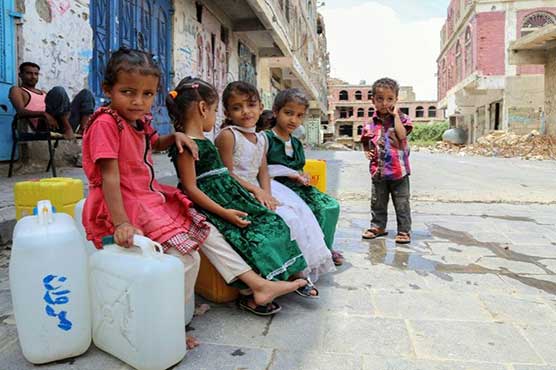Fears for civilians rise as clashes rattle Yemen port city

Yemen is now home to what the UN calls the world's worst humanitarian crisis
(AFP) – Government troops and rebels clashed again Tuesday near a Yemeni port city crucial for humanitarian aid, where hundreds of thousands of civilians could be trapped as war closes in.
The United Nations children s agency warned that that the fighting had placed the lives of dozens of children in danger at a hospital perilously close to the fighting.
Five days of battles between Iran-linked Huthi rebels and the army, allied with a regional military coalition led by Saudi Arabia, have left more than 150 combatants dead in the Red Sea province of Hodeida.
A spokesman for the Saudi-led coalition on Monday said the government alliance had no plans to launch a full offensive to retake Hodeida.
But multiple military officials on the ground reported their troops had encircled the rebel-held city.
The rebels have also confirmed fierce fighting in the area via their Al-Masirah television station.
The fighting comes as the United Nations pushes to restart negotiations between warring parties, after Geneva talks failed to materialise in September.
Hodeida is one of the last Huthi strongholds on Yemen s western coastline. The rebels seized the port, along with the capital, in 2014.
The rival Saudi-led camp, a powerful military alliance that includes the United Arab Emirates, has since retaken most of the country s ports.
Children at imminent risk
The United Nations children s fund -- which has called Yemen a "living hell" -- warned Tuesday that the fighting was now dangerously close to Al-Thawra hospital in the city s south.
The battle puts "59 children, including 25 in the intensive care unit, at imminent risk of death," UNICEF said in a statement.
UNICEF reported that medical staff and patients in the hospital, located between the fighting and port, had heard heavy bombing and gunfire.
"Access to and from the hospital, the only functioning one in the area, is now imperilled," it said.
"The toll in lives could be catastrophic if the port is damaged, destroyed or blocked," it added.
The port of Hodeida is crucial for aid delivery and food imports to Yemen, where famine looms over 14 million people and a child dies every 10 minutes, according to the UN.
Medics at hospitals in the Hodeida neighbourhood of Bajil reported they had received the bodies of 49 Huthi rebels on Tuesday morning.
Hospitals in government-held Mokha, south of Hodeida, said 15 soldiers had been killed.
Rights groups warn the worst could be yet to come in Hodeida.
Doctors Without Borders (MSF) on Tuesday said: "As fighting intensifies in Hodeida, MSF is concerned for patients and staff at Al-Salakhana hospital and for thousands of residents who remain in the city.
"All parties to the conflict must ensure that civilians and facilities such as hospitals are protected in Yemen," the aid group tweeted.
Save the Children has reported almost 100 air strikes counted by its staff at the weekend -- five times as many as in the whole first week of October.
Failing economy
The poorest country in the Arab world, Yemen is now home to what the UN calls the world s worst humanitarian crisis.
The World Health Organization says 10,000 people have been killed since the Saudi-led coalition intervened on the side of the government in 2015.
Yemen s government on Tuesday approved new budget and tax collection measures aimed at bolstering the central bank.
The cabinet backed the formation of a committee tasked with setting the government budget for 2019, according to state news agency Saba.
It also passed a resolution pushing for the collection of owed taxes and customs "on all taxable imports at all land, sea and air ports in liberated areas", or areas under government control.
The Yemeni riyal has plunged more than 36 percent this year, despite a $2-billion deposit in the central bank by Saudi Arabia aimed at saving the currency.
The riyal s slide has triggered a sharp rise in the prices of commodities, especially food and fuel, leaving millions unable to afford basic staples.

